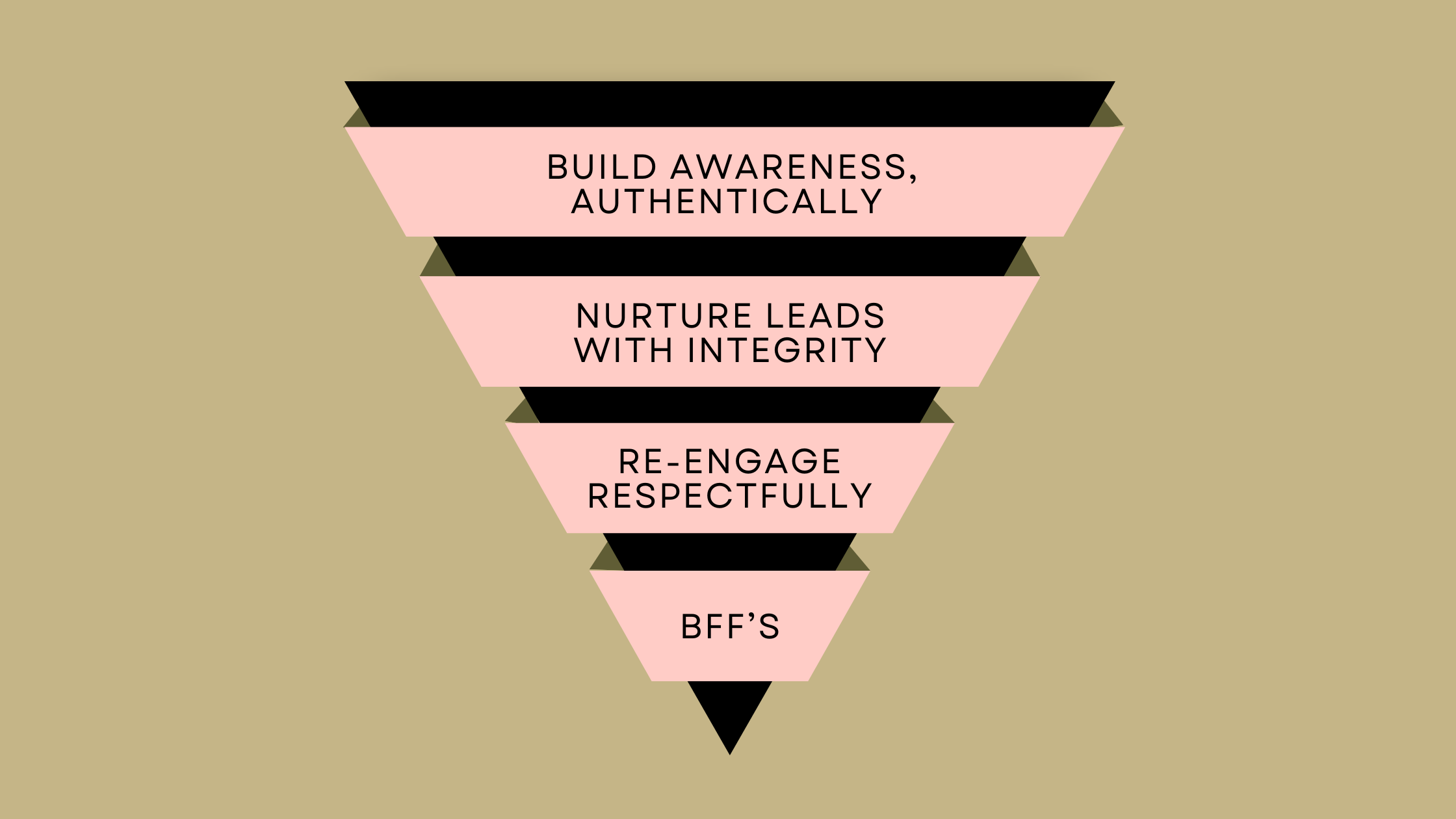In today’s digital landscape, creating an effective conversion funnel is crucial for business success. However, as ethical marketers, we must ensure that our strategies align with our values and respect our audience’s rights and expectations. This comprehensive guide explores the key ethical considerations at each stage of a typical marketing funnel, providing insights on how to maintain integrity while driving business growth.

1. Top of Marketing Funnel: Ethical Awareness Building
Content Creation: The Foundation of Trust
When crafting thought leadership articles, educational content, and blog posts, accuracy is paramount. Avoid the temptation to make exaggerated claims or present opinions as facts. Instead, focus on providing well-researched, valuable information that genuinely helps your audience.
Ethical Tip: Always cite your sources and be transparent about any potential biases or limitations in your content.
Social Media Engagement: Authenticity Matters
While it’s important to maintain an active social media presence, be mindful of the tactics you employ. Avoid using manipulative language or exploiting psychological triggers that could take advantage of your audience’s vulnerabilities.
Ethical Tip: Focus on creating genuine connections by responding thoughtfully to comments and engaging in meaningful discussions.
Free Resources: Value Over Data Collection
Offering free downloadable guides and webinars can be an excellent way to provide value to your audience. However, ensure that these resources are genuinely helpful and not just thinly veiled data collection tools.
Ethical Tip: Be transparent about any data collection associated with your free resources and provide clear opt-out options.
2. Middle of Marketing Funnel: Nurturing Leads with Integrity
Email Marketing: Respect and Transparency
Obtaining proper consent before adding individuals to your email list is not just a legal requirement but an ethical imperative. Be clear about what subscribers can expect in terms of content and frequency.
Ethical Tip: Implement a double opt-in process and make it easy for subscribers to manage their preferences or unsubscribe.
Case Studies: Honest Storytelling
When showcasing client success stories, accuracy is key. Avoid exaggerating results or taking credit for outcomes that weren’t directly related to your services.
Ethical Tip: Always get explicit permission from clients before featuring them in case studies, and offer them the opportunity to review and approve the content before publication.
Lead Magnets: Delivering on Promises
If you’re offering a free ethical marketing audit or exclusive webinar access, ensure that these lead magnets provide real value. They should not be thinly disguised sales pitches.
Ethical Tip: Clearly communicate what information you’ll collect and how you’ll use it when offering lead magnets.
3. Bottom of Marketing Funnel: Ethical Conversion Strategies
Personalized Outreach: Respecting Boundaries
When reaching out to qualified leads, respect their privacy and communication preferences. Avoid high-pressure tactics during consultations and give prospects the space to make informed decisions.
Ethical Tip: Provide clear options for prospects to opt out of further communication at any time.
Service Demonstrations: Honest Comparisons
When highlighting your services, focus on your unique value proposition without disparaging competitors. If you’re using comparison charts, ensure they’re based on factual, up-to-date information.
Ethical Tip: Include disclaimers if your comparisons are based on specific scenarios or time-limited information.
Limited-Time Offers: Authentic Scarcity
If you’re running workshops with limited spots or offering early-bird discounts, ensure these limitations are genuine. False scarcity tactics erode trust and go against ethical marketing principles.
Ethical Tip: Clearly communicate the reasons for any limitations or special offers, and honor these terms consistently.
4. Post-Purchase: Fostering Ethical Client Relationships
Onboarding and Ongoing Education
Set realistic expectations during the onboarding process and throughout the client relationship. Ensure that any exclusive content or masterclasses provided to clients offer genuine value, not just upsell opportunities.
Ethical Tip: Regularly seek feedback from clients about the value they’re receiving and adjust your offerings accordingly.
Feedback and Improvement
Handle client feedback responsibly and address concerns honestly. Use this information to improve your services and communicate these improvements back to your clients.
Ethical Tip: Implement a systematic way to collect, analyze, and act on client feedback, and be transparent about changes you make based on this input.
Referral Programs: Ethical Incentives
If you implement a referral program, ensure it doesn’t exploit relationships or incentivize unethical behavior. The program should reward genuine recommendations based on positive experiences.
Ethical Tip: Structure your referral program to benefit both the referrer and the new client, fostering a win-win-win situation.
Conclusion: Ethics as a Competitive Advantage
By embedding ethics into every stage of your marketing funnel, you’re not just doing the right thing – you’re building a sustainable, trust-based business that stands out in a values-driven market. But navigating this ethical landscape can be challenging.
Ready to elevate your marketing strategy with integrity and purpose?
Our team of ethical marketing experts can help you:
• Craft a values-aligned marketing funnel that resonates with conscious consumers
• Stay ahead of evolving ethical standards in digital marketing
• Build lasting client relationships based on trust and mutual respect
Don’t just adapt to the ethical marketing trend – lead it. Book a free consultation with us today, and let’s create a marketing strategy that’s as impactful as it is ethical. Your future clients (and your conscience) will thank you.
+ Leave a comment